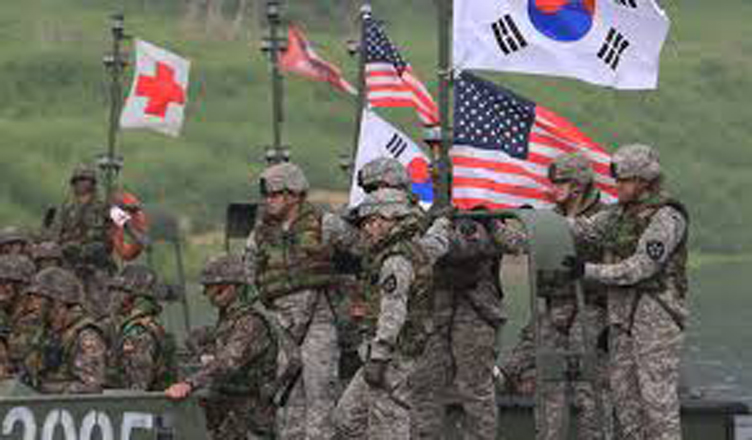(COLOMBO, LANKAPUVATH) –U.S. President Donald Trump’s declaration on Tuesday that he intended to end joint military exercises with South Korea took South Korean and U.S. military officials by surprise.
Although the Pentagon said Defense Secretary Jim Mattis was consulted ahead of time, current and former U.S. defense officials expressed concern at the possibility that the United States would unilaterally halt military exercises without an explicit concession from North Korea lowering the threat from Pyongyang.
“I’m sort of stunned about how much we gave up and how little we got in return,” said one former official, saying the decision “borders on irresponsible” and would erode readiness and diminish the credibility of the U.S.-South Korean alliance.
Trump made the remarks at a news conference after his summit with North Korean leader Kim Jong Un in Singapore, calling war games expensive and “provocative” – echoing a North Korean criticism that the United States had long rejected.
Trump also said he wants “at some point” to withdraw the American troops currently in South Korea.
“We have right now 32,000 soldiers in South Korea, and I’d like to be able to bring them back home. But that’s not part of the equation right now,” Trump said.
About 28,500 U.S. troops are stationed in South Korea, a legacy of the Korean War, which ended in 1953 in an armistice that left the two Koreas technically still at war.
If implemented, the end of military exercises could be one of the most concrete and controversial moves to arise from Trump’s summit with Kim, who pledged to pursue denuclearization but offered no details.
South Korea’s Presidential Blue House said it needed to “to find out the precise meaning or intentions” of Trump’s statement, while adding that it was willing to “explore various measures to help the talks move forward more smoothly.”
A spokeswoman for U.S. military forces in Korea said they had not received any direction to cease joint military drills.
The move could diminish the U.S. military’s ability to “fight tonight,” a term American commanders have used for years to describe the heightened posture of U.S. forces in one of the world’s most-sensitive military flashpoints. Even during budget cuts under Trump’s predecessor Barack Obama that eroded readiness elsewhere in the world, the Pentagon prioritized exercises on the Korean peninsula that included everything from air combat to infantry drills.
The U.S.-South Korean exercise calendar hits a high point every year with the Foal Eagle and Max Thunder drills, which both wrapped up last month.
Max Thunder’s air combat exercises so unnerved North Korea that it issued threatening statements that nearly scuttled the summit. Foal Eagle is designed to simulate war scenarios and involves ground, air, naval and special operations forces.
Asked about the plan to halt exercises, a U.S. official who spoke on condition of anonymity shrugged and called it a political, not military, decision.
The Pentagon declined to flesh out Trump’s remarks about suspending drills, a move the U.S. military had long resisted, saying it was working with the White House, U.S. allies and partners “on the way forward following the summit.”
Pentagon spokeswoman Dana White denied that Mattis was caught off guard by the announcement, telling Pentagon reporters: “There were no surprises.” In a separate statement, White said Mattis was “fully aligned” with Trump.




